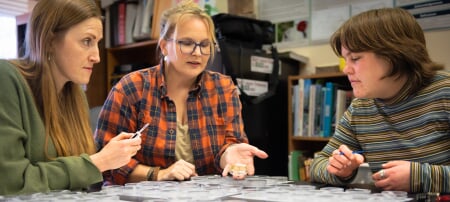Better than Perfect: Defects in Materials Could be Key to Better Batteries

Michigan Technological University researcher Reza Shahbazian-Yassar has discovered that perfection may not be all it’s cracked up to be, at least when it comes to designing materials for the next generation of lithium ion batteries.
Shahbazian-Yassar investigates exotic new battery materials, which offer exotic new problems along with exciting possibilities. He hopes to turn one of those problems into an asset, with help from a $446,000 grant from the Division of Materials Research at the National Science Foundation.
“Using new, high-performance materials to design electrodes has been a challenge,” says Shahbazian-Yassar, the Richard and Elizabeth Henes Associate Professor in Nanotechnology. “Usually, when we grow these materials, they come with a lot of defects.”
Sometimes, a single atom is missing. Sometimes it’s an entire row, creating a so-called one-dimensional defect.
Defects like these are generally considered to be a bad thing. A computer chip with such an imperfection, for example, could get thrown on a scrap heap. “But we thought, ‘Why not take advantage of them and do something good?” Yassar said. “Maybe we can use them to make a pipeline for lithium ions.”
Using transmission electron microscopy, his team has recently discovered that defects can serve as the path of least resistance for lithium ions traveling through an electrode. Now, with the NSF grant, they will peer more closely at those defects and analyze what happens as ions speed through them.
“Eventually, we’d like to perfect the defects and engineer a pipeline for the ions,” he said. “That could increase the energy and power of rechargeable lithium batteries.”
Michigan Technological University is an R1 public research university founded in 1885 in Houghton, and is home to nearly 7,500 students from more than 60 countries around the world. Consistently ranked among the best universities in the country for return on investment, Michigan's flagship technological university offers more than 185 undergraduate and graduate degree programs in science and technology, engineering, computing, forestry, business, health professions, humanities, mathematics, social sciences, and the arts. The rural campus is situated just miles from Lake Superior in Michigan's Upper Peninsula, offering year-round opportunities for outdoor adventure.




Comments